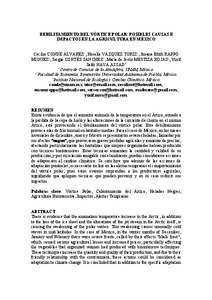Por favor, use este identificador para citar o enlazar este ítem:
http://hdl.handle.net/20.500.11765/9931
Debilitamiento del vórtice polar. Posibles causas e impactos en la agricultura en México
| Título : | Debilitamiento del vórtice polar. Posibles causas e impactos en la agricultura en México |
| Autor : | Conde, Ana Cecilia; Vázquez Toriz, Rosalía; Rappo Miguez, Susana Edith; Cortés Sánchez, Sergio; Mestiza Rojas, María de Jesús; Nava Assad, Yusif Salib |
| Palabras clave : | Vórtice polar; Calentamiento del Ártico; Heladas negras; Agricultura intensiva; Alertas tempranas; Polar vortex; Arctic warming; Black frost; Biointensive agriculture; Early warning |
| Fecha de publicación : | 2018 |
| Editor: | Asociación Española de Climatología; Agencia Estatal de Meteorología |
| Citación : | Montávez Gómez, Juan Pedro, et al. (eds.). El clima: aire, agua, tierra y fuego. Madrid: Asociación Española de Climatología; Agencia Estatal de Meteorología, 2018, p. 503-516 |
| Serie/Num. : | Publicaciones de la Asociación Española de Climatología. Serie A;11 |
| Resumen : | [ES]Existe evidencia de que el aumento anómalo de la temperatura en el Ártico, aunado a la pérdida de la capa de hielo y las alteraciones de la corriente de chorro en el mismo Ártico, está provocando el debilitamiento del vórtice polar. Este debilitamiento provoca olas de frío inusual en latitudes medias. Para el caso de México, en los meses invernales de diciembre, enero y febrero se presentaron severas heladas, llamadas por sus efectos “negras” que provocaron graves pérdidas agrícolas y aumento de precios, afectando particularmente las hortalizas que mujeres organizadas habían producido con técnicas biointensivas. Estas técnicas aumentan la cantidad y calidad de su producción, y por su relación amigable con el ambiente, pueden considerarse acciones de adaptación al cambio climático. Se concluye que además de las acciones de adaptación puntuales, es necesario incluir en las alertas tempranas el comportamiento del vórtice polar, pues estos eventos sorprenden a los productores agrícolas, impidiendo que apliquen técnicas que pueden prevenir y en su caso reducir sus impactos. [EN]There is evidence that the anomalous temperature increase in the Arctic, in addition to the loss of the ice sheet and the alterations of the jet stream in the Arctic itself, is causing the weakening of the polar vortex. This weakening causes unusually cold waves in mid-latitudes. In the case of Mexico, in the winter months of December, January and February there were severe frosts, called by their effects "black frost", which caused serious agricultural losses and increased prices, particularly affecting the vegetables that organized women had produced with biointensive techniques. These techniques increase the quantity and quality of their production, and due to their friendly relationship with the environment, these actions could be considered as adaptation to climate change. It is concluded that in addition to the specific adaptation actions, it is necessary to include polar vortex behavior in the early warnings systems, as these events surprise agricultural producers, preventing them from applying techniques that can prevent and, if possible, reduce their impacts. |
| Descripción : | Ponencia presentada en: XI Congreso de la Asociación Española de Climatología celebrado en Cartagena entre el 17 y el 19 de octubre de 2018. |
| URI : | http://hdl.handle.net/20.500.11765/9931 |
| ISBN : | 978-84-7837-098-6 |
| Colecciones: | (2018, Cartagena). XI Congreso AEC |
Ficheros en este ítem:
| Fichero | Descripción | Tamaño | Formato | ||
|---|---|---|---|---|---|
| 0046_XI_2018_CONDE.pdf | 108,76 MB | Adobe PDF |  Visualizar/Abrir |
Los ítems de Arcimis están protegidos por una Licencia Creative Commons, salvo que se indique lo contrario.





